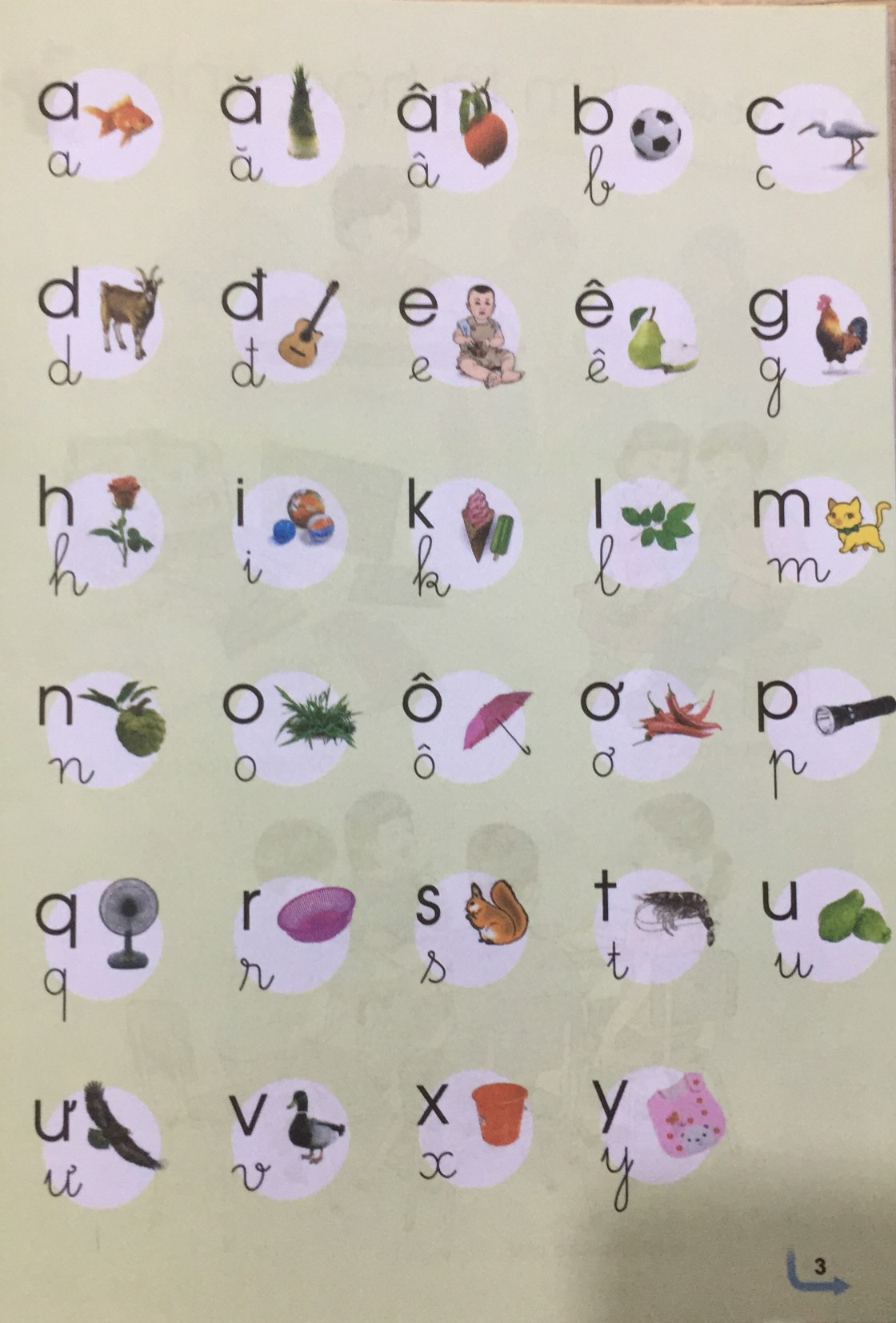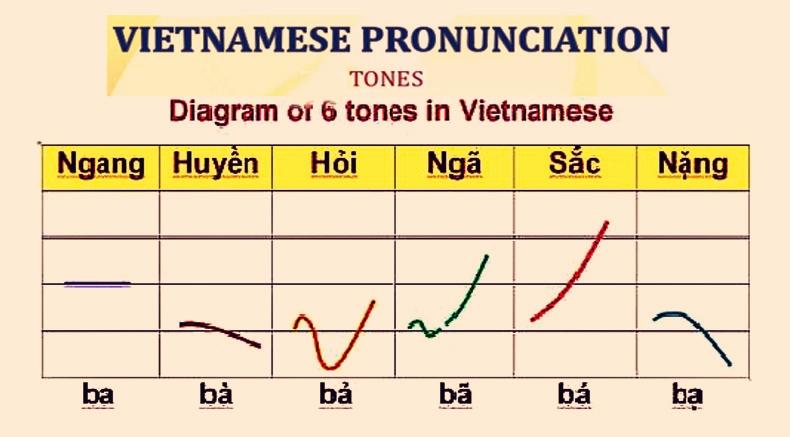Everyone has their own learning Vietnamese experience. Some think it’s super easy. Some think it’s super hard. It depends on their native languages and their experience with other languages.
Here are breakdowns of what makes Vietnamese easy or challenging for learners. You will figure out your own answer for the question: Is Vietnamese easy to learn?
Is Vietnamese easy to learn? What makes Vietnamese easier to learn?
Here are 7 reasons make Vietnamese easier for learners.
Latin-based alphabet
If you are an English speaker, you don’t need to learn another new alphabet. Vietnamese use the same alphabet that English uses. It helps you read and write Vietnamese easily. There are 29 letters in Vietnamese alphabet.

By learning tones, consonants, vowels and how the words are formed, you can guess how to pronounce them correctly without knowing the meanings. You will be surprised with your ability.
The words are always pronounced in the same way
In English, in some cases, a word with the same letters may be pronounced in different ways, depending on the context, tenses, parts of speech, etc.
For examples:
read /riːd/ (Infinitive) – read /red/ (Simple past)- read /red/ (Past participle) are pronounced differently.
Or, the word “row”. It is pronounced /rəʊ/ to describe a line of things, people, animals, etc. arranged next to each other. And, it is pronounced /raʊ/ to describe a noisy argument or fight.
In Vietnamese, the words are always pronounced as they are spelled. No confusion.
Vietnamese has no verb endings, genders and plurals
Verbs in Vietnamese have no tenses, no verb forms like European languages.
For an instance, the word “speak”:
- In Spanish, the word “speak” (hablar) will be express in many ways, depending on the subtleties, tenses, mood: hablo, hablas, habla, hablamos, hablé, hablaba, hablaré, hablaría
- In English, there are “speaks”, “speaking”, “spoken”, or “spoke”
- In Vietnamese, speak means nói. That’s it!
Vietnamese has no grammatical gender. Unlike French, Spanish, or German, it doesn’t distinguish between masculine and feminine words.
Moreover, Vietnamese has no plural rules. You don’t need to worry about whether a noun is countable or uncountable, or whether to add -s or -es at the end.
When greater specificity is needed, Vietnamese expresses it by adding quantifiers or classifiers before the noun, such as một người (one person), những người (some people, those people), or các người (you all).
Don’t care about articles “a” and “the” in Vietnamese
How to use articles “a” and “the” in English may be a nightmare for some English learners. However, in Vietnamese, you’re free. Based on the context, the others will understand exactly what you are mentioning.
Learn Vietnamese tenses quickly
With just 5 words in front of the original verb, you can express tenses in Vietnamese
- đã: It is used to express the action in the past
- mới: It is used to express the action in the recent past, more recently than đã
- đang: It is used to express the action is happening right now, at this very moment
- sắp: It is used to express the action will happen soon, in the near future
- sẽ: It is used to express the action in the future
- (There are a few others, but with these 5 you’ll be fine in 99% of situations.)
Let take an example with the verb “đi chơi” (hang out):
- Tôi đi chơi: I hang out (“tôi” means “I”)
- Tôi đã đi chơi = I hung out.
- Tôi mới đi chơi = I just hung out, I recently hung out.
- Tôi đang đi chơi = I am hanging out (right now).
- Tôi sắp chơi = I am going to hang out.
- Tôi sẽ đi chơi = I will hang out.
Better yet, we often skip these words entirely if it’s obvious from the context. For example: “Hôm qua, tôi đi chơi” (I hang out yesterday)
Vietnamese vocabulary is incredibly logical
Vietnamese vocabulary are constructed logically. Rather than learning an entirely new word, as you would in English, Vietnamese often combines simple words to form more complex meanings.
For example, if máy means “machine” and bay means “flying”, then, máy bay quite logically means “airplane.”
Here are a few more fun examples:
- A bench is a “long chair” (ghế dài)
- A refrigerator is a “cold cupboard” (tủ lạnh)
- A bra is a “breast shirt” (áo ngực)
- A bicycle is a “pedal vehicle” (xe đạp)
- To ski is “to slide snow” (trượt tuyết)
- A turkey is a “western chicken” (gà tây)
- A zebra is a “striped horse” (ngựa vằn)
This transparent, compound-word system makes it much faster to pick up new vocabulary. Once you learn enough core words, you’ll find yourself recognizing and understanding dozens of new terms without even trying. It’s like unlocking a whole new level of comprehension automatically.
Loanwords
Due to long history, cultural exchange, trade, etc. Vietnamese have borrowed many words from Chinese (Sino-Vietnamese Words), French, English and other languages, which can be helpful for learners who know some Chinese, English or French, ect.
Loanwords in Vietnamese are often phonetic approximations of the original word, adapted to fit Vietnamese pronunciation and spelling conventions. Sometimes, they’re combined with native words or given new meanings over time.
Example:
- Cà phê (from café – coffee)
- Bơ (from beurre – butter)
- Phô mai (from fromage – cheese)
- Ga (from gare – train station)
- Cà ri (from curry – Indian origin)
- Xì dầu (soy sauce – from Cantonese)
- Tivi (TV)
- Máy tính (computer – literally “counting machine”)
- Hotgirl, idol, fan
- Giáo dục (教育 – education)
Is Vietnamese easy to learn? What makes Vietnamese challenging?
Here may be 3 typical difficulty for a Vietnamese learner:
6 tones
Vietnamese is a tonal language, meaning the pitch of a syllable can change its meaning. There are 6 tones in Vietnamese. They are: ngang, huyền, sắc, nặng, hỏi, ngã

In Vietnamese, changing the tone of a word doesn’t just alter how it sounds. It creates an entirely different word with a different meaning. And sometimes, using the wrong tone can lead to some unintentionally awkward or even humorous situations.
For example, take the word “ma”. Depending on the tone, it can mean very different things:
- ma (mid-level tone) means ghost
- má (high rising tone) means mom
- mà (low falling tone) is a conjunction
- mạ (low rising tone) means rice seedling
- mả (falling-rising tone) means grave
Imagine, you accidentally called your friend’s mother a ghost. lol
For students whose native languages are non-tonal, learning Vietnamese can be quite a challenge. But once you immerse yourself in the sounds of the language, you’ll start to notice the difference. Allow your ears to gradually adjust to Vietnamese tones and rhythms.
Pronunciation
Vietnamese has unusual sounds and consonant/vowel combinations that can be challenging for English speakers.
For example:
- Tươi (Fresh)
- Nghiêng (tilt)
- uống (drink)
Pronouns
Vietnamese has a complex system of pronouns that vary based on age, gender, and social status.
For instance, instead of using a single word like “you” or “I,” Vietnamese speakers choose pronouns that reflect the relationship between the speakers.
For example:
- A younger person might call themselves “em” (younger sibling) and address an older person as “anh” (older brother) if the other person is male, or “chị” (older sister) if female.
“Em chào anh/chị” – “I greet you” (from a younger person to an older one).
- When speaking to someone significantly older, one might use “cháu” (grandchild) for oneself and “bác” (uncle/aunt) or “ông/bà” (grandfather/grandmother) for the listener.
“Cháu cảm ơn bà” – “Thank you, grandma.”
- In formal or respectful contexts, people may use titles or professional roles instead of personal pronouns, such as:
“Thầy ơi, em có câu hỏi.” – “Teacher, I have a question.”
(Here, thầy = male teacher, em = student)
Conclusion
Vietnamese is generally considered as a moderately difficult language. For speakers of tonal or Asian languages (e.g., Mandarin, Thai), Vietnamese can be relatively approachable. For native English or Romance language speakers, Vietnamese is moderately difficult due to tones and pronunciation, but easier than Chinese or Arabic in terms of grammar and writing.
However, even difficult things become a breeze with consistent practice and familiarity! Vietnamese isn’t that hard. It’s absolutely doable. Many people have mastered it, and so can you!
FAQs
Is Vietnamese hard to learn?
For native English or Romance language speakers, Vietnamese is moderately difficult due to tones and pronunciation. For speakers of tonal or Asian languages (e.g., Mandarin, Thai), Vietnamese can be relatively approachable.
Vietnamese is generally considered as a moderately difficult language. But it’s easier than Chinese or Arabic in terms of grammar and writing.
How many tones in Vietnamese?
There are 6 tones in Vietnamese. They are: ngang, huyền, sắc, nặng, hỏi, ngã. However, in the Southern dialect, the two tones “hỏi” and “ngã” pronounced identically, but this is not a big obstacle in communication between Northern and Southern dialects.
How many letters in Vietnamese alphabet?
There are 29 letters in Vietnamese alphabet.
Is Vietnamese a tonal language?
Yes, Vietnamese is a tonal language. It has 6 tones in standard.
How difficult is learning Vietnamese?
Vietnamese is difficult due to tones and pronunciation. But it’s not a big deal.
If you need a tutor accompanying you in Vietnamese learning journey, contact Viettalki.
⭐ Read more:




